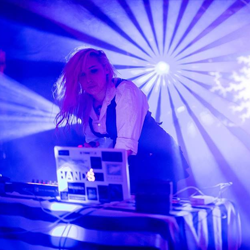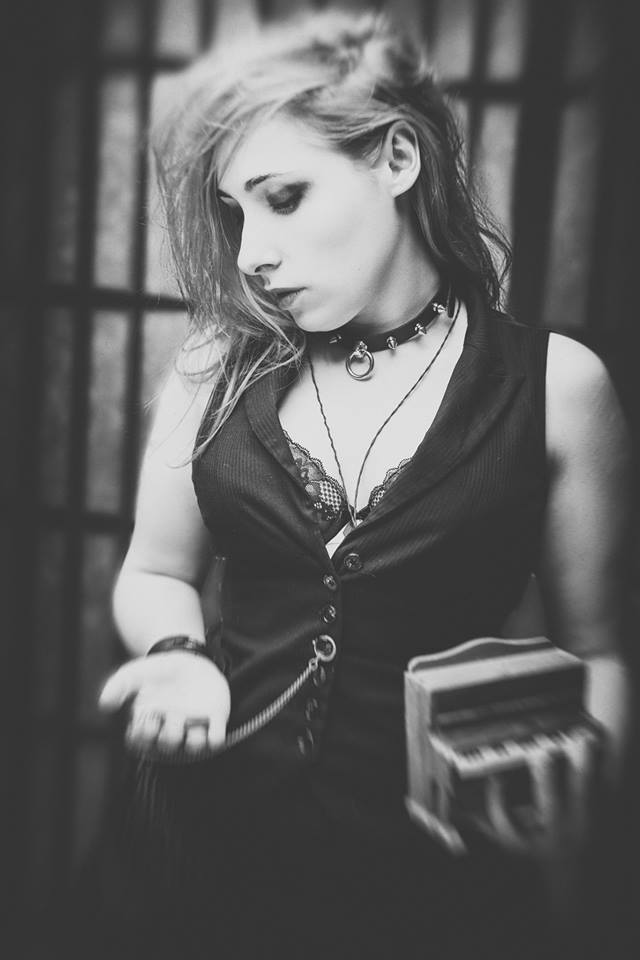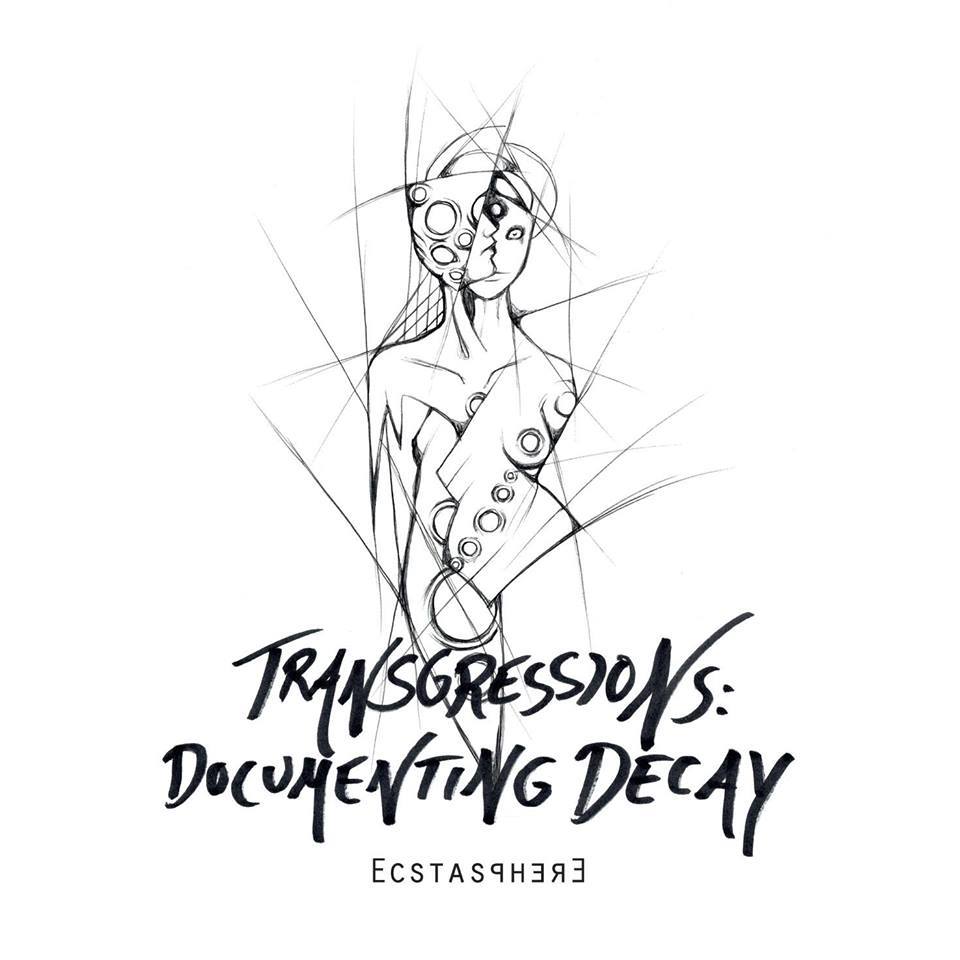Published by Alessandro Violante on January 1, 2018
 Approximately three years ago, the debut album by Ecstasphere, rhythmic noise project of Ophelia The Suffering, was released by Raumklang Music and, three years later, the prolific musician just released Ecstasphere’s third album on French label Audiotrauma. In the meanwhile, two albums were released under the Aphexia moniker, plus two self-releases. Transgressions: Documenting Decay, that’s the title of her new album, is, until now, the last milestone of a research that brought Ophelia’s sound towards even more personal, unique sonic territories, distant from rhythmic noise clichès. That’s why we’ve decided to interview her again.
Approximately three years ago, the debut album by Ecstasphere, rhythmic noise project of Ophelia The Suffering, was released by Raumklang Music and, three years later, the prolific musician just released Ecstasphere’s third album on French label Audiotrauma. In the meanwhile, two albums were released under the Aphexia moniker, plus two self-releases. Transgressions: Documenting Decay, that’s the title of her new album, is, until now, the last milestone of a research that brought Ophelia’s sound towards even more personal, unique sonic territories, distant from rhythmic noise clichès. That’s why we’ve decided to interview her again.
Hi Ophelia! We did our first interview two years ago. At that time, we talked about Carnival of Catharsis and Breathe, and now we talk about your new album, “Transgressions: Documenting Decay”. There are a lot of things to talk about, but let’s start focussing on its themes. On Bandcamp notes, inner and social decay, capitalism, fascism, social injustice are mentioned as key topics. It seems to me that in your past releases you’ve mainly focussed your attention on yourself, now you’re focussing more on society, as a mirror of your condition. Am I right?
Hello Alessandro, let me start off by saying I’m glad for this opportunity to discuss the album with you.
So in regards to your assumption, I agree that the previous Ecstasphere albums mainly dealt with my personal experiences and feelings, while “Transgressions: Documenting Decay” is also about society as a whole. But I would rather say I am focussing on society being a mirror of all of our inner conditions, and also the other way around. My proposition is that we should all acknowledge that the horrific politicial climate we are facing today is a reflection of the direction we are headed in socially. When we’re looking at the currently ongoing rise of fascism all over the world it is extremely important to keep in mind that the political climate is shaping all of us and of course is being shaped by all of us and in many cases our lack of resistance towards the predatory form of capitalism we’re living on. After a short period of severe depression following the 2016 US election I decided that I could no longer make unpolitical music. My opinion is that in these times we live in, we as artists can no longer afford to be neutral. We have to use our voices to make a statement. We have to position ourselves clearly and stand up for what we believe in, be more critical than ever. I want my message to be understood, more than ever.
The sound direction of your new album has been preannounced by three songs, here included, already released. I remember Distance was released on last year’s Snowflakes compilation (Raumklang), Dissolved Girl on Katharsis Compilation, Reformation on your last Klangporträts release, if I remember correctly. In a certain sense, this time you gave some hints to the listeners about where your music was heading to. Do you agree with this?
That is quite precise, yes. Some of the tracks were previously released on compilations in different versions, such as Dissolved Girl and Dysfunction. Reformation I left untouched – the only difference to the original version on Klangporträts III is that the track was remastered for the album version. And yes, I definitely wanted to familiarize those listeners who are following my music closely with the direction I’m headed in. I like being transparent about my process – I find it oddly disconnecting and lonely to leave my listeners unsure of what I am working on until the next album is released.
When The Gates (by Aphexia, Ophelia’s other project) was released, its promo notes mentioned prog rock as one of your main influences. It seems to me that the “physical” component of prog, rock and metal is becoming more important in your music. In “Transgressions” this is more evident. When have you become interested in these music genres?
When I grew up, as a child, I was constantly surrounded by prog music because my mother used to listen to it a lot. I am convinced that being confronted with complex compositional structures from early on helped my musical development a lot. I will always be grateful for that. So when I was at an age when I started to choose and discover new music on my own, I was immediately drawn to Metal and later especially Progressive Metal, Opeth and Tool were my favorites and they kind of still are. Then came a long period of being interested mainly in electronic music. It wasn’t until I was seventeen or eighteen that I rediscovered Prog Rock again, I was drawn to the sound of Steven Wilson, The Mars Volta, Haken and the likes and from then on, Prog has become one of the genres I listen to the most.
That’s a curiosity. Have you sung all the vocal parts of The Document, including the screaming parts? It seems to me a perfect bond of electronic music and metal.
Thank you so much! I am pretty satisfied with the way that track turned out. Yes, I sung all the vocals, including the screams. I had been training guttural singing for a while before I recorded the screams on this album.
It’s not by chance I talk about electronic music, as according to me what initially was rhythmic noise now has changed its shape becoming a hybrid form that now I would define as purely electronic. It’s a more faceted formula. Do you agree with this?
Well, actually, I would say quite the opposite: the album’s sound is not purely electronic, in contrast to the previous Ecstasphere albums I used lots more physical instruments on “Transgressions: Documenting Decay”, so to me it feels less purely electronic and more like, as you said, a hybrid form. But of course, you’re absolutely right when you’re saying that my sound is moving away from being easily describable as simply Rhythmic Noise. It’s much more than that.
It seems to me on “Transgressions” there are less piano parts, and these sound more dissonant, darker. In your previous releases, they sounded more classical-influenced. Do you agree with it?
Yes, this album is less influenced by classical music than its predecessors. It’s part of the concept.
Undoubtedly, on “Transgressions” rhythm has a major role. More complex than in the past, far from the classic four-on-the-floor established rhythmic noise formula, more syncopated, sometimes “broken”, in a certain way close to 90’s sound. You’ve worked with dubstep rhythms too. Have you an interest in always exploring new solutions?
Well, it’s no secret that I have never been particularly fond of the straight four-on-the-floor beat. I can’t think of a single Ecstasphere track with that rhythm. In terms of exploring new solutions, I am constantly trying to refine my sound and evolve my compositional approach, so I am glad to hear you think my use of rhythm has advanced.
“Transgressions” is the most “straight to the point” album of your career until now. It’s the first time it has ten songs. Do you agree with this?
For some reason it was really important to me to make this album shorter than the previous ones. “Feed Your Head” and “Carnival of Catharsis” both are about 65 minutes long. For the new album, I really wanted to make it possible to listen through the record in one sitting without getting distracted or losing focus. I have a tendency to overload everything, so it was important to me that I try to keep in mind that reduction and editing is also necessary to perfect your art. So with 54 minutes, “Transgressions: Documenting Decay” should be short enough to sit through with uninterrupted attention and long enough for me not to feel as if I haven’t said enough.
Who was Ophelia in 2014 and who is she now? It seems to me your music has evolved a lot since “Feed your Head”, although only three years passed. Do you feel you’ve grown as a person too?
Oh my, what a question! I don’t want to get too personal here, but I can say that a great deal has changed since 2014, and I have too. My view on the world has changed and my approach to music too. I think I’d rather leave it at that and advise anyone interested in my personal development to listen through my discography again with that aspect in mind – I think my music speaks more clearly about myself than I can do with words.
While listening to the odd tempo of Displaced Desires, as I’m a neophyte of prog music, I made some research on the genre and I’ve found one article where the author said that using odd tempos make music less immediate than using 4/4 tempos. What do you think about this opinion? Do you feel like your music is easily understandable?
I don’t necessarily think that odd tempos make music less immediate. On the contrary, composing in a free flow without limiting yourself to one symmetrical meter allows you to change rhythms anyway it feels right for the song. Of course, for listeners who are not used to asymmetrical rhythms, it might create a sort of disconnect, a difficulty to follow this free flow of the music. I think it depends on the way they are used in a composition. If you listen to Tool’s last two albums for example, you will notice how they manage to merge so many different meters in one song and it feels completely intuitive and natural. On the other hand, there are other artists, especially in the current Prog Metal scene, who play with the unpredictability of their rhythms, which of course makes the physical experience less immediate for the listener, because you have to listen to the material several times before you can move your body to it. As for my music, I think it is pretty easily understandable. As long as you have your head, heart and body all listening at the same time, it should be rather conclusive, I am hoping.
In February you’ll play in Prague at Audiotrauma Festival (and we’ll be there), and your new album was just released by the French label. How have you discovered them and how have you joined them?
I still remember, the first Audiotrauma release I came across was Le Jouet by Twinkle and I fell in love with it immediately. I remember thinking what an innovative take on Industrial this was, how different it sounded to the “mainstream” rhythmic noise sound of our humble music scene. Since then, I have come to this same conclusion with some other Audiotrauma releases. For example, Music For Ghosts by Sonic Area is a masterpiece beyond comparison. It is just undescribably well-written and well-produced music. Naturally, I felt drawn to Audiotrauma and Ant-Zen, and so I was really glad when Sylvain of Audiotrauma expressed interest in my music. We get along really well, and apart from the fact that I just like him as a person, I feel that we share similar artistic visions. It has been a pleasure working with the Audiotrauma crew so far. Chris Shortt is an amazing guy as well, working with him is heavenly. And he is also a great musician, have you heard his project’s new album, Verin‘s This is not an exit? It is just delicious! Another amazing Audiotrauma release.
Also the artwork seems to me different from those of your past albums, here Lisa Schwabe focuses on the human being, while the past cover artworks were, according to me, closer to a “monstrous” and “fictional” imaginary. Is it just my way of perceiving them or has something changed? How does the process of creating the cover artwork happen? Do you suggest the topic to her?
I think in this case in fact it’s just your way of perceiving them. The artwork has always played with the motives of the humanoid and the monstrous or the phantastical, and when you open the digipak of “Transgressions: Documenting Decay” and see the other drawing by Lisa, you will see this reflected again. Our process is quite simple. Lisa and I know each other really really well, and I trust her to transform my music into something visual. Sure, we talk about what I have in mind a little, but the most important part of the process is this: I give Lisa the album, sometimes in a finished and sometimes in an unfinished state, and she just visualizes what the music feels like to her, and draws it. And usually it is exactly the way I feel it too. I have become so used to it working this way, but actually it is pretty amazing. She is utterly brilliant, and I am really lucky that she likes working with me the way I like working with her.
For this album, Arco Trauma has made the mastering. Who did it for your past albums? Which differences have you found?
Feed Your Head and “Carnival of Catharsis” were mastered by the adorable Alexander Dietz, who uses lots of analogue gear in his mastering process. He has a really gentle and thoughtful mastering style, never uses too much compression, makes electronic music sound incredibly warm. The “Klangporträts” releases were all mastered by Henning Hinck aka Voidscream, who is a really good producer and when mastering electronic music has a way of making it sound really “fat” and emphasizing the more bassy parts of my music just the way they were intended. And now of course, Arco Trauma, the fabulous Sonic Area, mastered my new album. What I found remarkable is that when I listened to his mastering I could just hear that he likes and understands this album. I immediately noticed that he put lots of thought into making the tracks sound just the way they were intended to.
Maybe I’m wrong, but I think I’ve never asked you what Ecstasphere means. Is it a curiosity, but it could be interesting for our readers.
ECSTASPHERE is the ecstatic sphere.
Thanks for your time, I hope you’ve had fun answering our questions. If you want to, greet the readers and invite them to buy your new album!
Thank you for the interesting questions – always a pleasure to talk with you, Alessandro! And an even bigger thank you goes out to all of my listeners – I am so thankful for your support and the honor of penetrating your ears, minds and hearts with my music. If you’ve never heard of me, now is the perfect time to immerse in my sound. You’ll find the new album on https://ecstaspheretrauma.bandcamp.com/. And also, come see me live next year! I’ll be playing in Italy, France, The Netherlands, Czech Republic and Germany.




